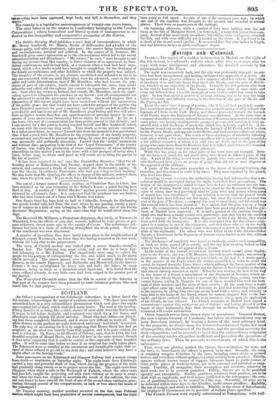SCOTLAND.
An Orkney correspondent of the Edinburgh Advertiser, in a letter dated the 6th instant, acknowledges the receipt of a curious missive. " We have been much astonished here at a very extraordinary phenomenon which took place two nights ago—a great fall of dust, which continued many hours. The men at the herring- fishing describe it as being like a thick shower of snow-drift from the North-west. It began to fall before daylight, and continued very thick for a few hours, and afterwards more slightly till about mid-day. Those who had clothes out bleach- ing had them completely blackened, and it seems very difficult to wash off. The white flowers in the gardens are quite destroyed, and every ' kail-blade' is covered. The only way of accounting for it is by supposing that Mount Hecla has had an eruption; as the wind was exactly from that quarter, and it is quite evident the dust is volcanic. Dr. Barry, in his History of Orkney, says, that in 1783, the last dreadful eruption of Mount Hecla, the dust fell here in the same manner, though it does seem surprising that it could be carried so far—upwards of four hundred miles. It will be some time before we hear if an eruption has really taken place. The fishermen were so terrified at the uncommon and inexplicable sight, that se- veral of them refused to go out to sea next day; and some believe it may have a slight effect on the herring-trade."
Some passengers on the Edinburgh and Glasgow Railway had a narrow escape from death or mutilation on Saturday night. The night-train from Edinburgh carried a long and powerful shaft of iron, which during the progress of the train had gradually slung round, so as to project across the line. The night-train from Glasgow, when about a mile to the Westward of Falkirk, which the other train had dust left, caught the projecting rod with such violence as to carry it away; and when the train was stopped to ascertain the result of the collision, the iron red was found to have entered the front of one of the second-class carriages, pene- trating through several of the compartments, an inch or two above the heads of the passengers!
. On Tuesday morning, another accident occurred on the line, near Polmont station, which might have been productive of serious consequences, had the train
been going at full speed. An axle of one of the carriages gave way; by which one end of the machine was brought to the ground, and smashed in several places. There were no passengers in the carriage.
On Saturday afternoon, while a number of boys were bathing near the red lump at the foot of Margaret Street, [in Greenock,] a large fish joined their com- pany. Several of the more timid ran ashore; but others, more courageous, attacked the fish, and with some difficulty got it landed on the shore. It was found to be a shark of the shovel-nosed species. It measured four feet nine inches in length, and was nineteen inches in girth.—Glasgow Argus.


























 Previous page
Previous page